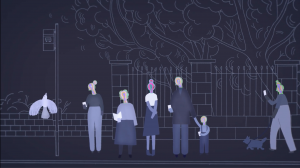Autism Mainly Affects Young Children…
My son was diagnosed autistic at age four. This prompted me to research ways to understand and support him. It was during this research that I slowly started to identify as autistic myself. Arriving at this new understanding of myself at age 43 has helped both of us.
There is an overwhelming amount of information directed at the parents of newly diagnosed children both online and in books but the quality is variable, some of the information is just plain wrong and often autism is still portrayed as a pitiable tragedy. I found the best information for children comes from autistic adults and is based on their years of lived experience. This makes sense; after all, wouldn’t you want to learn French from someone who speaks the language?!
 I wish I had done it immediately but gradually, I connected to a wider autism community on social media which was supportive and understanding. These autistic groups signposted me to resources written by autistics for autistics and I found that when I had a question someone, somewhere had an answer. I realised we were not on our own and often autistic adults were happy to help and share knowledge and ideas. Although no two journeys along the same path are identical non autistic parents can benefit from the lived experience of autistics prepared to share a map and compass.
I wish I had done it immediately but gradually, I connected to a wider autism community on social media which was supportive and understanding. These autistic groups signposted me to resources written by autistics for autistics and I found that when I had a question someone, somewhere had an answer. I realised we were not on our own and often autistic adults were happy to help and share knowledge and ideas. Although no two journeys along the same path are identical non autistic parents can benefit from the lived experience of autistics prepared to share a map and compass.
Through the support of other autistic adults, I have learned that being autistic means we process and experience the world differently to the majority of people and that this neurological difference is a natural part of human diversity. Accepting my autism has set me free to enjoy it as part of my identity although I can also acknowledge being autistic brings challenges as well as strengths. For example, I can’t filter sound so I hear everything at the same volume even background noise which can make listening in everyday environments very difficult. On the other hand, I have a great memory and remember detailed information easily.
Building confidence and self-esteem are important for any child and autistic children are no different; this should not need to be said and yet the language that surrounds autistic children is often pathologizing and downright degrading. By listening to other autistic adults, I also reframed the language I used to describe my son and his challenges, his challenges are not minimized but he is spoken about in a respectful way that builds him up. Unless we all use more respectful and positive language how can children grow up valuing themselves and feeling worthy of love? Disrespectful language excludes and ‘others’. Respectful language is the language of inclusion.
Autistic children like my son, grow up to be autistic adults and that is why it is important that we try to make Scottish society more accepting of autistic people. Autistic mums like me, understand how difficult it can be to grow up in a world that is not designed with you in mind.
By learning from autistics and changing the narrative around autism we can all change perceptions and help end the stigma. By accepting the full range of human diversity we can build a modern Scottish society which is inclusive and where all members are respected and valued for their contribution.